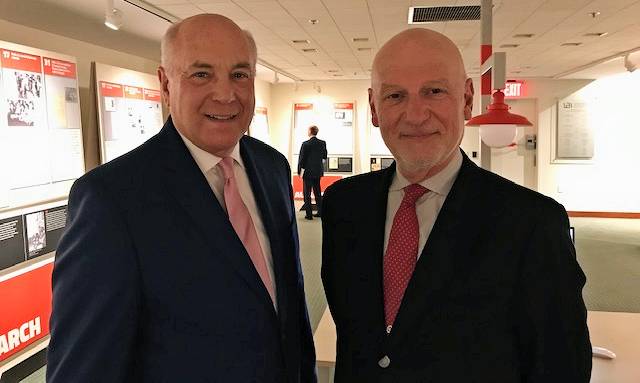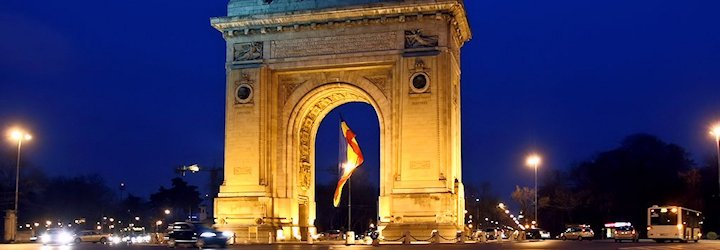
The Birth of the RACC
The formation of the Romanian-American Chamber of Commerce (the "RACC™") in February 1990 marked an early milestone in the course of Romania's emergence from beneath the cloud of Nicolae Ceausescu's brutal brand of communism. A journey through the RACC's quarter century is a march through a past dotted with the formative personalities and events that shaped Romania. It is a story of support, dedication, hard work and affection for a people and a nation by Americans, many of whom had no prior ties to Romania, and others who were persecuted by Romania’s communists, had their properties stolen and were hounded out of the country.
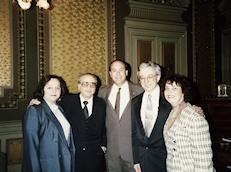
It all began one month after the Romanian revolution in January 1990, when a group of American business leaders and professionals led by Mark A. Meyer, Esq., an international lawyer based in New York, met to form the Romanian-American Chamber of Commerce™. The founding of an independent, apolitical and bilateral organization devoted to developing and improving Romanian-U.S. relations and commerce was important to the newly formed National Salvation Front government, which encouraged the RACC's founders from the outset. Although there had been an organization of American business interests whose members traded with the Ceausescu regime, it had virtually dissolved sometime prior to the December 1989 Romanian revolution. Consequently, representatives of major US firms, such as IBM, Coca-Cola, Deloitte & Touche, Chemical Bank, Colgate-Palmolive, Caterpillar, ConAgra, RKO, and GE, as well as smaller import export companies, were delighted to participate in the formation of a new entity devoted to expanding relations with a newly-free Romania. With only a few exceptions, none of the firms participating in the formation of the RACC had much prior experience in Romania. They banded together in New York and, in February 1990, organized the RACC. These US companies would become America�s business pioneers in a fledging market that had far more promise than reflected in the harsh reality existing after the fall of Ceausescu's rule.
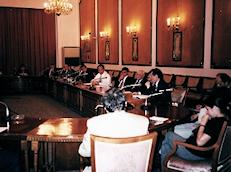
In February 1990, Romania had virtually no private businesses, no land holdings or leaseholds, few private automobiles, a crumbling infrastructure, little money with which to develop the nation, and no modern business laws. The legal framework for a market economy was based on codes dating back to the interwar period with which few people had much knowledge. Romanians' anguish over their plight was tempered by hope, although shrouded in the stupefying grayness of the Mitteleuropa winter accentuated by the continuation of the Ceausescu policies that kept the street lights off at night and long lines for food and other necessities. Citizens of Bucharest wandered the nighttime streets with flashlights while foreign visitors congregated in the Intercontinental Hotel watching babies being sold for adoption by criminal elements and eating almost indigestible food. Yet as Americans arrived, they were quite literally embraced in the streets in bear hugs by happy tearful Romanians declaring that they had been waiting fifty years for the Americans to come.
The relatively fair and free election of Ion Iliescu as President on May 20, 1990 was, unfortunately, followed on June 13th by an incursion of thousands of miners from Romania's Jiu Valley into Bucharest that led to many days of riots in which miners brutally beat protesters angry that Iliescu's party had won the elections, opposition leaders and even passersby. It was an ugly week that hurt the new government�s image and cost it dearly by keeping investors away and most-favored-nation treatment unattainable for another three years. It also made the RACC's task of promoting trade and investment between the United States and Romania that much more difficult.
The Early Years
On October 4, 1990, the RACC held its first event a breakfast for President Ion Iliescu with forty US business leaders at the Metropolitan Club in New York. This event was followed in November 1990 with a two-day RACC Conference on Privatization held at the Intercontinental Hotel in Bucharest. Led by Mark Meyer, senior representatives of Republic National Bank, Hill & Knowlton, Delloite & Touche, Colgate-Palmolive and Credit Commercial de France, as well as leaders from the New York City Council, spoke on aspects of creating and managing a successful privatization program. Co-sponsored by Romania's National Agency for Privatization, and key-noted by video presentations made for the event by Senator Claiborne Pell, then Chairman of the US Senate Foreign Relations Committee, and Senator Fritz Hollings, the then Chairman of the US Senate Commerce Committee, the event was covered at length by the Romanian media. Meetings ensued with President Iliescu, Prime Minister Petre Roman, then-Foreign Minister Adrian Nastase and a significant number of other government ministers and business leaders aimed at establishing a strong link between the RACC and the government and people of Romania.
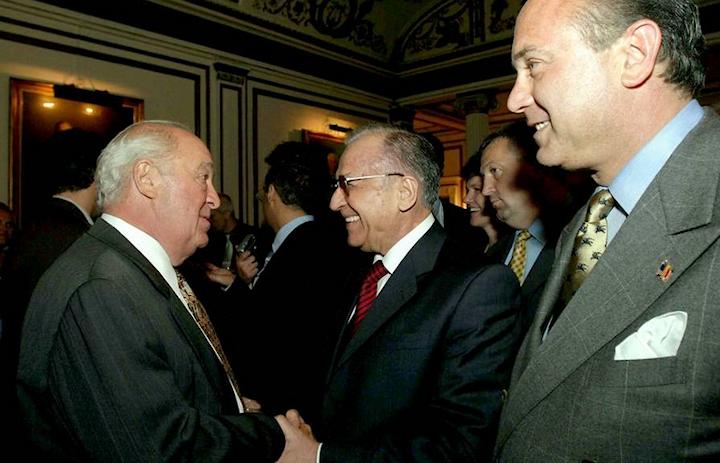
RACC Dinner for President Ion Iliescu at the Metropolitan Club in New York.
By early 1991, the RACC had retained Jay McCrensky as its Executive Director, opened offices in Washington, D.C., and commenced holding monthly meetings, usually involving visiting Romanian government leaders, parliamentarians, bankers, and some businessmen, as well as US business leaders and government officials. Few meetings had less than a hundred attendees. In the pre-Internet era, there was little information readily available about Romania except through participation in such meetings. The RACC was the forum chosen by virtually all Romanian leaders to address the US business community. The first US luncheons or dinners held for the US business community with Prime Ministers Petre Roman, Radu Vasile, Mugur Isarescu, Victor Ciorbea and Adrian Nastase as well as Presidents Iliescu and Constantinescu were RACC events.
In 1991, the RACC signed a protocol with the Romanian Chamber of Commerce and Industry, executed by its then President, Aurel Ghibutiu. The Romanian Chamber of Commerce and Industry became the Chamber's official partner in the United States. Re-executed on a number of occasions since then, this document still forms the basis of the continued affiliation between the RACC and Romania's Chamber of Commerce and Industry.
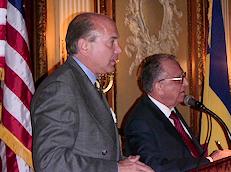
The early 1990s were turbulent years for Romania as it emerged from over forty years of draconian communist rule. During these early years, the RACC achieved many of the goals that were central to its creation. It helped reintroduce Romania to the US business community as an important trading partner, and it encouraged U.S. investment in Romania. The RACC played an equally significant role in introducing Romanian business and government leaders to American businesses. In the political context of the early 1990s and throughout the decade, this was not a simple task. Nevertheless, the Chamber was able to encourage trade and investment between Romania and the United States and develop links that led directly to hundreds of millions of dollars of business between the two nations.
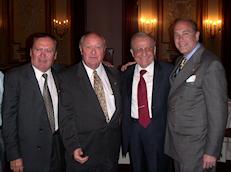
In 1992, the RACC took up the effort to effort to obtain Most Favored Nation Trading Status for Romania. While other former East Block nations like Hungary and Poland had obtained MFN treatment from the United States in June 1990, Romania was fighting an uphill battle, often against its own Diaspora who vehemently objected to the designation while Ion Iliescu remained President. Much of the outrage stemmed from the belief that the miners' rampage of June 1990 was encouraged by President Iliescu and it was compounded by the sense that since so many ex-communists held important positions in the new Romanian government, the revolution had been a sham to cover up a coup d'etat. Somewhat fancifully, the Diaspora hoped that delaying MFN might result in the removal of President Iliescu and the then government by a disgruntled Romanian populace, to be replaced by persons without a communist past. Sadly, the net result of their efforts was only to make doing business with Romania costlier and therefore less attractive than with its neighbors, reducing jobs, income and other opportunities for Romanians who desperately needed foreign investment. In 1992, the RACC took up the cause of MFN for Romania, lobbying Congress and the Administration over the objections of many Romanian Diaspora organizations. In November 1993, the US Congress finally granted Romania Most Favored Nation Trading Status and the Romanian government and media recognized the RACC's efforts in achieving this goal, declaring that the RACC's work in this matter was one of the ten most significant acts of the year for Romania and granting it the then annual Libertatea Award.
The Moldovan-American Chamber of Commerce™
With the independence of the Republic of Moldova, a desire arose among the members of the RACC to create a separate sister organization to assist Moldova in its transition to a prosperous market economy. The Moldovan-American Chamber of Commerce™ ("MACC") was created in 1993 as a non-profit corporation to facilitate opportunity development, networking, information exchanges and cooperation between U.S. and Moldovan businesses.
Anyone who joins the MACC automatically becomes a member of the RACC -- and visa versa - thereby providing membership in two separate chambers of commerce for the price of one! Although not as active as the RACC, the MACC also conducts conferences, seminars, luncheons, and special events for member�s to network and facilitate business development, while providing direct assistance to members in achieving their objectives in Moldova and the United States.
The MACC has held luncheons or dinners for Moldova's Presidents Mircea Snegur, Petru Lucinschi and Vladimir Voronin, as well as many of its other leaders. Just last month, MACC members attended a private dinner in New York with Moldovan Prime Minister Vlad Filat and Foreign Minister Iurie Leanca in New York.
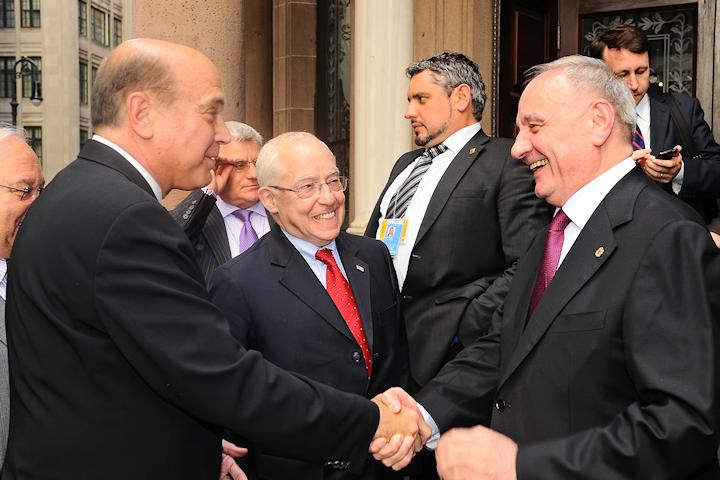
Mark Meyer welcomes President Nicolae Timofti of the Republic of Moldova to a luncheon with business leaders in his honor in New York City (with former United States Attorney General Michael Mukasey).
The Privatization Era
With privatization in full swing by the late 1990's, the RACC geared up to provide targeted assistance to its members by providing in-depth symposiums on various aspects of the privatization process and organizing investment missions. Although there is really no way to tell for certain, the RACC believes that it has been responsible for facilitating over half a billion US dollars in investment in Romania over the years.
As interest in Romania began to grow, particularly with the start of the new decade, the RACC sought to create chapters in other cities and states in the U.S. These proved to be by fits and starts with some developing well and others going no where. Today, the RACC maintains chapters in New York, California, Ohio, Florida and Washington, DC. The chapters have their own officers and boards of directors and decide upon their own activities, sometimes with the support of the national office and the national chamber's Executive Director. The most active chapter is the New York Chapter, who's President, Elias Wexler, (also a National Vice President) is a successful entrepreneur manufacturing fireproof and soundproof materials and door systems at Zero International, Inc., which maintains eight manufacturing and distribution facilities selling in 32 countries.
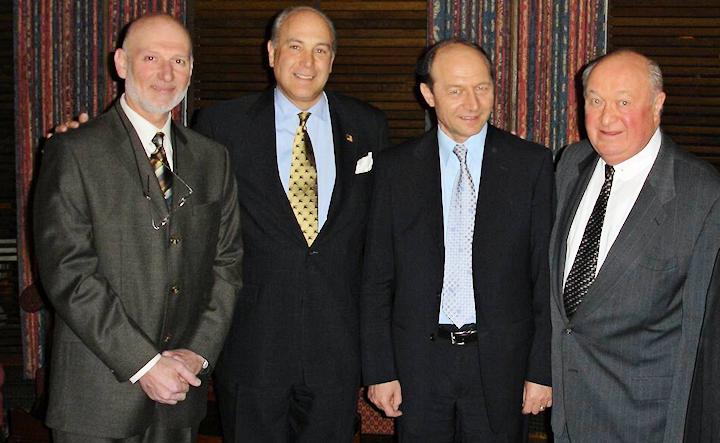
Romanian President Traian Basescu flanked by National RACC Chairman Mark Meyer
and RACC Vice Presidents Elias Wexler and Armand Scala.
As Romania geared up its efforts to join the North Atlantic Treaty Organization, so did the RACC. Once again, the RACC lobbied the US Congress and the Administration and played a crucial role in pressing Romania's successful bid for NATO membership not only in the United States but in Europe as well. This time, the RACC was joined by the Congress of Romanian-Americans led by its President, Armand Scala; also a National Vice President of the RACC. These efforts culminated in President George W. Bush's historic visit to Bucharest on November 23, 2002 to welcome Romania into NATO. Facing a crowd of over one hundred thousand Romanians patiently waiting in a pouring rain, the President told them: "The promises of our Alliance are sacred, and we will keep our pledges to all the nations that join us. Should any danger threaten Romania -- should any nation threaten Romania, the United States of America and NATO will be by your side. As a NATO ally, you can have this confidence -- no one will be able to take away the freedom of your country."
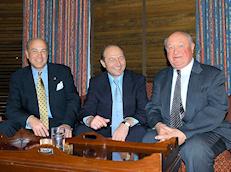
By 2004, the RACC was conducting web-based teleconferences with leading personalities, ministers, ambassadors, and even President Ion Iliescu. After the election of President Traian Basescu, the RACC hosted an event for him on his visit to Washington, DC, as well as private meetings for RACC Corporate Council members. The nature of the interest in RACC programs has become increasingly refined and targeted. An excellent example was the RACC sponsored two day conference in San Francisco chaired by RACC Florida Chapter President Alfred Goldberg and RACC California Chapter President Charles Chongo on April 26-27, 2007 for over a hundred IT executives from the United States and Romania. Towards the end of the last decade, the RACC initiated monthly Chapter President (and Corporate Council) telephone conferences to plan programs and develop new strategies. These conferences include representatives from the Romanian Embassy in Washington, as well as from the consulates.
The RACC's Third Decade
Ushering in its third decade of existence was the RACC's election to membership on the Board of the European-American Bi-National Chambers of Commerce, the only bilateral chamber from a newly admitted EU member state in the organization. The European-American Bi-National Chambers of Commerce of the United States is the association of the EU member states' bilateral chambers of commerce in the United States and includes the British, French, German, Italian, Greek, Austrian, Belgian, Finnish, Portuguese, Luxembourg, Spanish, Irish, Danish, and Swedish bilateral chambers, as well as the Swiss Chamber as an associate member.
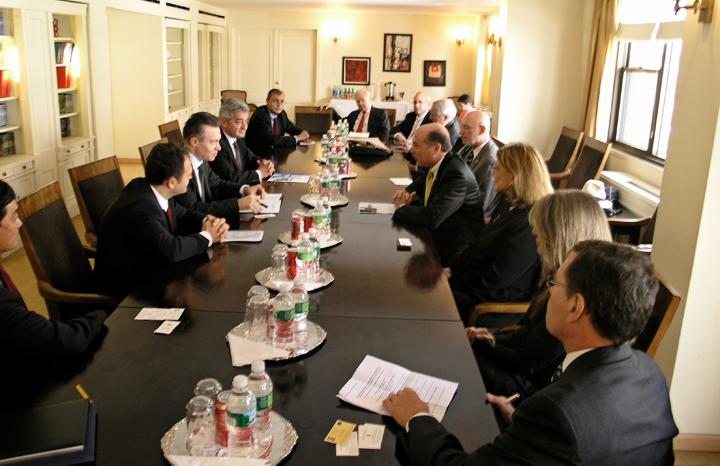
RACC Corporate Council Meeting with Romanian Foreign Minister Cristian Diaconescu and Ambassador Adrian Vierita
in New York, September 25, 2009.
Both the RACC and the MACC are registered trademarks that protect their names from being used by others. On several occasions during the past twenty years, the RACC has enforced its trademark rights, including in successful litigation in the United States District Court, against persons seeking to confuse the public for person financial gain.
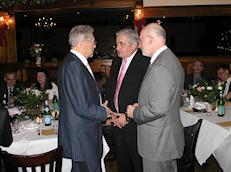
An Ambassadorial Advisory Board of the Romanian American Chamber of Commerce™ was formed last year comprised of the living former U.S. Ambassadors to Romania and the former Romanian Ambassadors to the United States and United Nations. It is chaired by former U.S. Ambassador, Senator James C. Rosapepe, and its members include former U.S. Ambassadors to Romania John R. Davis, Alfred Moses, Michael Guest and Mark Gitenstein, and former Romanian Ambassadors Mircea Geoana, Sorin Ducrau, Ion Gorita, Alexandru Niculescu and Mihnea Motoc. Among its functions, the Ambassadorial Advisory Board holds webinars for the public to discuss current issues in U.S.-Romanian relations. Each year, the RACC holds an annual dinner at which it awards its Armand Scala Prize. The Chamber maintains LinkedIn and Facebook pages, as well as a Tweeter feed that can be accessed on our Home Page, taking advantage of the Internet's social networking phenomena, and conducts bi-monthly member web conferences. The RACC also runs an annual investment mission to Romania, and it’s various chapters organize their own events throughout the United States. Indeed, over the years, the RACC has organized over one hundred and fifty conferences dealing with trade and investment issues throughout the United States and Romania. A list and accompanying description of just some of those many events since 2005 can be found in the Past Events Section.
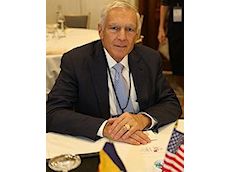
The RACC™ is the sole representative chamber in the United States for Romania recognized by the European American Chamber of Commerce in the United States - the umbrella organization of the EU's U.S. bilateral Chambers of Commerce.
Today, the RACC continues to be the meeting point of business and government leaders from both Romania and the United States. It has proven itself ready to adapt as business, commerce, and technology have evolved with each passing decade. In both favorable and troubling times the RACC continues to strive to be an innovative institution that excels in sustaining and further developing relations between Romania and the United States. For these reasons, we look to the next twenty-three years with great optimism and eagerness.
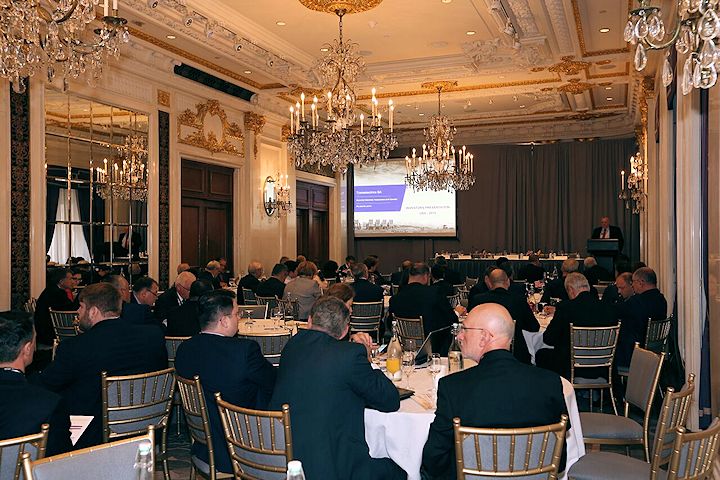
RACC’s BestInvest Romania Forum at St. Regis Hotel in New York, September 28, 2015.
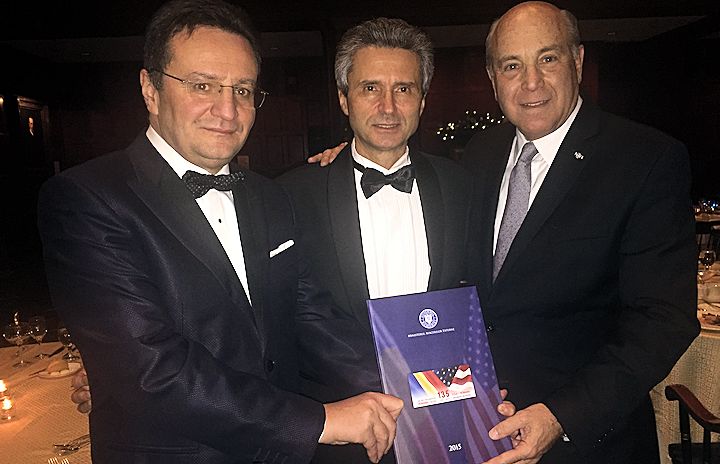
H.E. Ambassador George Maior, Romania's Ambassador to the United States, and H.E. Ambassador Ion Jinga, Romania's Permanent Representative to the United Nations, with RACC National Chair Mark A. Meyer at the Romanian-American Chamber of Commerce's Annual Holiday Gala at the Harvard Club in New York on December 19, 2015. Ambassador Maior presented Mr. Meyer with a book and block of stamps issued to commemorate the 135th Anniversary of the establishment of bilateral diplomatic relations on June 14, 1880 under the presidency of Rutherford B. Hayes and the reign of King Carol I of Romania.
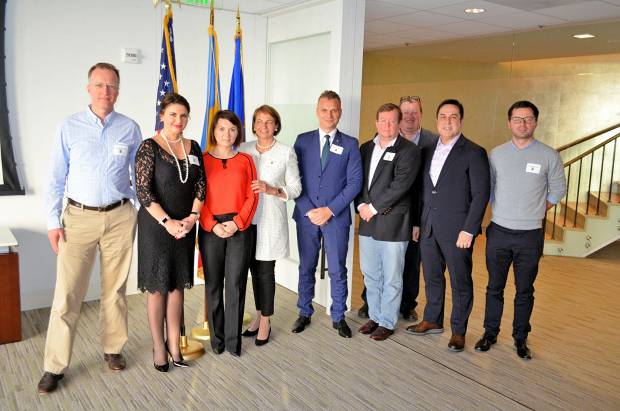
June 29, 2017 marked the opening of the Romanian American Chamber of Commerce San Francisco Chapter. Among the guests attending were Cosmin Dumitrescu, the Consul General of Romania in Los Angeles, Mark Chandler from the San Francisco Mayor's Office of International Trade and Commerce, Dana Beldiman, the Honorary Consul General of Romania in San Francisco, and Simona Steriu, Economic Consul for the Consulate General of Romania in LA. The President of the Chapter is Mr. George Roth.
